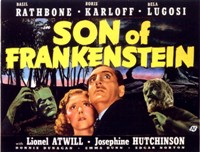Son of SOPA
 The House Judiciary Committee held a markup hearing on the Stop Online Piracy Act, H.R. 3261, the bill that is quickly shaping up to be this year’s big copyright battle. I’ve written two prior posts on the bill, Part I and Part II.
The House Judiciary Committee held a markup hearing on the Stop Online Piracy Act, H.R. 3261, the bill that is quickly shaping up to be this year’s big copyright battle. I’ve written two prior posts on the bill, Part I and Part II.
This is a good opportunity to recap where I came out at the end of my last post: SOPA in its then-current form was very troubling. The most troubling part was Section 103, which seemed to have been drafted with two inconsistent goals in mind, as if the co-authors were Dr. Jekyll working alongside Mr. Hyde: on the one hand Section 103 appeared to offer limited supplemental remedies in suits brought under existing copyright and trademark law, and on the other it appeared to significantly modify existing law by creating a free-form cause of action and a notice-and-takedown regime that went far beyond what the DMCA enacted thirteen years ago. For the reasons I stated in the post, I believe that the former reading — the Jekyll version if you will — had to be the correct one, because both the alleged new cause of action and the apparent notice-and-takedown regime were radically under-specified. I’m still concerned that critics of the bill are cementing an overly broad reading of it — the Hyde version — by not even acknowledging the Jekyll reading as a possibility. (This is akin to a concern that copyright scholar Jessica Litman has recently expressed as well, that copyright critics may ironically worsen the doctrines they are concerned about by asserting the most damaging interpretation.)
In addition to all that, SOPA as introduced had an overly broad scope for (what I argue are) the supplemental remedies — they appeared not just to apply to sites infringing in the U.S. but as a practical matter immune to traditional means of enforcement — the so-called foreign “rogue sites” — but to any website, anywhere, even one that a U.S. court would have no problem directly enforcing a preliminary injunction against with contempt sanctions. That is, even if Section 103 were amended to make clear, as I believe it should be, that the remedies involving domain names and ad networks are supplemental means of enforcement, it did not expressly limit itself to situations where there is a need for such extraordinary remedies. I would hope that courts would nevertheless apply such limits anyway, but that might be asking a lot from a court unfamiliar with the policy debates.
In advance of today’s hearing, SOPA’s main sponsor, Rep. Lamar Smith, offered a “manager’s amendment” to the bill making several changes. Does Smith’s amendment fix the above problems? Yes and no.

